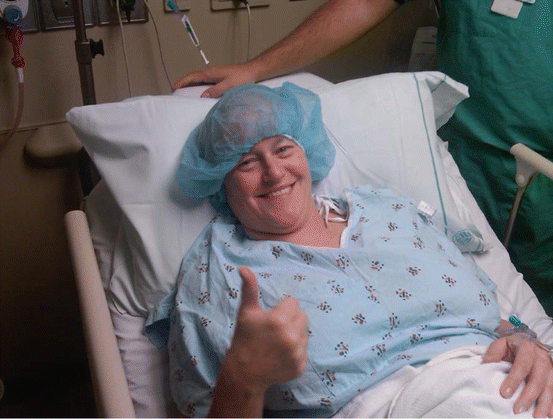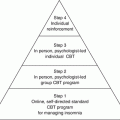My family rubbing my bald head for good luck in our holiday photo 2011, the year I was diagnosed with ovarian cancer
19.2 An Overnight PhD in Patient Expertise (Navigating the Medical World)
When my OB/GYN told me he’d be referring me to a gynecological oncologist, it sounded like he was speaking a foreign language. Many of the medical terms and even the names of the specialties that were bandied about in those bewildering few days when I was at my most vulnerable were challenging to pronounce and even more challenging to comprehend. It is easy to feel overwhelmed and alarmed by the breadth of one’s ignorance, and getting up to speed on what is happening within your body and why and what your options are to combat this new foe can seem like an impossible task. It can also be emotionally daunting to learn about what is happening to you and what lies ahead, to get your head around mutations and poison seeping into your bloodstream and cells being destroyed.
But I am a firm believer in being a hands-on partner in this medical battle. Your doctors and medical team are not doing this to you, they are doing this with you. An informed patient is one who will know what should be happening and can therefore be on the lookout for things that have gone awry. An informed patient knows her own body and can report what is working and what symptoms need added attention. And an informed patient asks probing questions, seeks second opinions, and explores multiple options to ensure she is getting the best care possible. So here are my thoughts on how to be an informed patient, what to do and what not to do to secure not only the best outcome but also the smoothest journey.
First, whenever possible, take someone with you to your appointments. There is simply too much information coming at you in an abbreviated amount of time (most doctors run continuously behind schedule and do their best to be in the moment with you, but the reality is that there is a lot to cover and little time to do so) and too much going on. Your thoughts are racing and trying to process what was just said and now you’ve missed the next key piece of information. Having someone there with you ensures that two sets of ears are taking all of this in. My husband accompanied me to almost all of my major appointments and he took copious notes. These notes helped us review what we were told, compile questions about things we needed to better understand or about which we wanted to seek additional information, and sometimes only made sense to us weeks or months down the road, when a procedure or treatment was upon us and we could refer back to the notes describing it.
Be an engaged and active partner in your care. Tell your doctor things he should know about you. In an ideal world, our doctors would be able to sit with us for hours and learn about our fears and life goals, but that is not the reality of most medical appointments these days. So be proactive. I learned early on that nausea was my push-button issue. I have a pretty high tolerance for pain, but I have none for nausea. It impacts every aspect of my life because when the world is spinning, you have to lie down, and a bedridden Katya is a miserable Katya. I learned to advocate for myself, to alert my medical team that my nausea was intolerable and that I couldn’t do 5 months of it without going insane. They, in turn, made getting in front of my nausea a top priority. Each of my chemo sessions was followed by several days of intravenous antinausea drugs (a better course for me than ingesting them) and fluids to keep me hydrated. They would not have known to do this, to find a solution for a problem that was bringing me down, had I not advocated for myself and made sure it was on their radar.
Another way I advocated for myself was to let them know what an active, busy life I had. I let them know all of the plans I had for the summer – college visits with my son, out-of-town Scrabble tournaments, outings with my kids and husband – all of which I was loath to miss. I made it clear that my emotional well-being was inextricably linked with my physical well-being and that continuing to live my life as before was important to me. We made the joint decision, based on my need to maintain my busy schedule and to travel throughout the summer, to forego the clinical trial for which I was qualified because that would have required me to stay put in Charlotte for the whole summer. I needed the flexibility of scheduling my chemotherapy around my schedule rather than being bound by a clinical trial’s strict regimen of care. This was the best decision for me, but it was only reached because I shared important information about myself and my medical team took that into account when laying out my options and advising me what to do.
And no matter how renowned and fabulous your doctor and medical team may be, it is always helpful to get a second opinion. Let me revise that, since I am being hypocritical given that I didn’t officially seek a second opinion for myself. I am blessed to have a slew of doctors as relatives and friends, so my second opinions came frequently – often solicited but sometimes unsolicited – and I did not feel the need to seek a formal second opinion. I do think it is important to ensure that you have as much information as possible – from more than one source – when making crucial decisions about your medical care. A doctor who is secure in her professionalism and expertise should not resist your seeking a second opinion. I would be wary of any doctor who doesn’t want you to question what she says or seek confirmation of her diagnosis or plan of attack.
Sometimes, even when we do a masterful job of advocating for ourselves, things do not work out as planned. When my cancer recurred, and I faced my seventh surgery, I explained to my new surgeon (who specialized in splenectomies, which is why my oncologist referred me to him) that I had suffered a mysterious rash and infection or allergy (the source of the rash baffled my entire medical team) following each of my last three surgeries. I had also been hospitalized with a postsurgical infection a full 3 months after my mastectomy that had required a 5-day stay in the hospital and had almost killed me. I told him that I did not want to leave the hospital before we were sure that the rash was gone for good, because I had returned via the emergency room several times, and we all agreed that it was best to avoid letting things get to that point. When my body responded to the splenectomy the way it had for my previous surgeries, my new doctor prescribed antibiotics. The rash went away and he came by to discharge me.
“But it tends to come back after a day or two,” I explained, frustrated because I had already handed him, on a platter, my one concern about my surgery when I’d met with him in our initial consultation.
“Go home,” he said patronizingly, patting my stomach (the same one that had just experienced a major surgery). “It’ll resolve itself.”
I ended up calling in some of my friends who are doctors on staff at the same hospital, and they, in turn, called in an infectious disease specialist who agreed that I should stay an extra day or two to ensure that the second type of antibiotic (because the rash had, as predicted, flared up again after the first antibiotic) did the trick.
That experience marks the only time in my entire cancer journey that prompted me to write a letter of complaint. The irony is that my clinical outcome was great. I had the surgery on a Friday, I was released on a Tuesday evening, and I was working out at the gym the next morning. This surgeon’s skills are considerable. But those skills cannot exist in a vacuum. I did not feel heard, and that is the death knell of the doctor-patient relationship. Only treating my spleen, and ignoring the heart and brain that are attached to that spleen, makes for bad medical care. If this happens to you, stand up for yourself. Make sure that your concerns and questions are addressed. You deserve no less. (I now share my experience with groups of doctors, residents, and medical students in large part because I know that there are many more marginalized patients out there who do not have the resources I did to rectify the situation.)
We now live in a time where much of the information that was once only available in medical school is now readily accessible to all of us on the Internet.
I caution you to proceed carefully with these floodgates of information. The good news is that there is a wealth of information out there about every type of cancer. The bad news is that not all of the information is correct or appropriate for you to see. I made a conscious decision to limit my access to the Internet as a resource for learning about ovarian cancer. Frankly, what little I saw was downright depressing. I opted instead to focus on the positives and use the Internet to research specific treatment options or side effects I was experiencing.
When my neuropathy (a nerve sensitivity that is a common by-product of chemotherapy) reared its ugly head a full 8 months after my treatment was finished, I was flummoxed and beyond frustrated. Visiting websites that shared home remedies for combatting the annoying tingling and reading about women who had it way worse than I did (always a good remedy in that it gives you perspective and stops any pity party in its tracks) proved helpful.
Each patient will have to navigate what works best for her in terms of staying informed and playing an active role in her care. For me, my doctor friends and relatives proved invaluable in translating impenetrable medicalese and helping me weigh my options. For others, it may be a cancer support group or a chemo navigator or a particularly informative and accurate website. The source of the information is not as important as the information itself. Stay informed, if for no other reason than it allows you to regain some of the control that was taken from you when the Big C first rocked your world.


On my way to my double mastectomy in December 2011. Nothing says “I feel vulnerable” more than a hospital gurney and the prospect of major surgery
19.3 At Least I’ll Lose Some Weight… Not (Managing Your Physical Symptoms)
I am almost embarrassed to admit this, because it makes me seem so shallow, but one of my first thoughts after learning I had cancer was that at least I would finally lose some of my unwanted pounds. My antiquated view of cancer conjured up emaciated women who couldn’t keep anything down. I figured that would be a silver lining, but that was definitely not the case for me. I had no appetite on my chemo days, but I more than made up for it on other days. I was getting a heavy dose of steroids to help with my nausea and other symptoms, and I was also thrust into menopause overnight thanks to my hysterectomy. I actually put on weight during cancer, and I know I am not alone.
Stay updated, free articles. Join our Telegram channel

Full access? Get Clinical Tree




